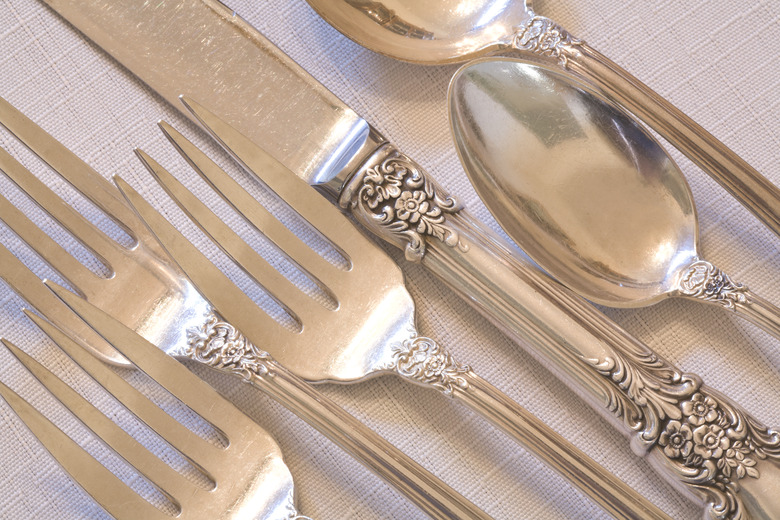How To Clean Tarnished Silver-Plated Silverware
We may receive a commission on purchases made from links.
When silverware tarnishes, it's not your fault. Pure silver resists tarnish, but both silver plate and sterling silver — even nickel — darken over time as alloy components oxidize. It is seldom harmful to the silverware, but it's certainly nice to clean it so you can enjoy your silverware. Tarnish darkens dramatically over time, especially with ornate and complex designs that can be hard to clean.
Luckily, it's all easier than you think. The easiest way to polish silver is simply to soak it in a baking soda and boiling water solution with some tinfoil. A fascinating reaction occurs where all the tarnish moves over to the foil, leaving shiny silverware.
Various Methods for Removing Tarnish
Various Methods for Removing Tarnish
Silverware can be polished in all kinds of ways. Ketchup, for instance, is a fun way of polishing silver. Slather it on, let it sit 20 minutes, and then buff it off. The same premise is behind trusted brands, like Silvo silver polish — apply, sit, buff. Others swear by using toothpaste. Inevitably, they're all successful from similar chemical reactions that cause the tarnish to lift away so it can be polished to a shine.
These can be really messy solutions, so it's advisable to spread newspaper over the table before you get started. Another irritating issue is when the tarnish-attacking agent of choice, be it toothpaste or ketchup or polish, builds up inside any ornamental decor. Those curlicues and engravings and delicate designs make silverware such a treat on a well-dressed table until you see that greening, crusty old polish caking up in the designs.
Polishing agents are necessary for wooden- and bone-handled silverware, as you don't want to risk soaking or staining the handles. For hollow-core or solid silverware, there's a better way.
Soak Away the Tarnish
Soak Away the Tarnish
When there are no fussy handles to complicate matters, let baking soda do the heavy lifting for you. All you need is some tinfoil and some baking soda to create an electrolytic magic trick that will transfer all the tarnish from your silver to the tinfoil.
1. Prepare the Basin
Line a soaking tub, large pot, or even your sink with tinfoil — shiny side up — and lay the silverware in a single layer across the tinfoil. It's important that every piece is in contact with the foil for this reaction to be effective.
2. Prepare the Soaking Solution
Dissolve 2 tablespoons of baking soda for every liter of boiling water you use. You'll need enough to pour this simple solution over the silverware until it's submerged completely.
3. Walk Away and Let Science Get to Work
Let it sit for anywhere from 10 to 30 minutes or even longer. What slowly happens is that the baking soda water induces the tarnish to transfer to the tinfoil. If all the tarnish hasn't lifted, you may need to repeat the process once or twice.
4. Remove the Silverware and Buff It
By now, hopefully the tinfoil is black, and the silverware is shiny, but it may seem flat, so it wants a good buffing. Baking soda can be abrasive, so give the silverware a little shake as you remove it and then buff with a soft cloth.
Between cleanings, keep your silverware gleaming with a jeweler's polishing cloth, which is great for watches and jewelry too. Wash the silverware with sudsy water and dry it before using this.
Things to Remember With Silverware
Things to Remember With Silverware
This method is wonderful because it's environmentally friendly and also because it's nonabrasive. With toothpaste or even actively polishing with a baking soda paste, you run the risk of scratching. Light scratches accumulate over time, and the older your silverware, the greater the odds are that it's already happening. So, avoid anything abrasive and your silverware may look stunning for generations.
The best way to reduce tarnish in the first place is to use your silverware every day. Some people wash good silverware in the dishwasher with acid-free detergent, but experts advise cleaning it by hand. So stop saving your best silverware for rare occasions and visitors. You deserve to eat like royalty and live your best life every day while limiting any polishing hassles.
